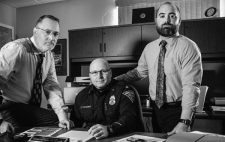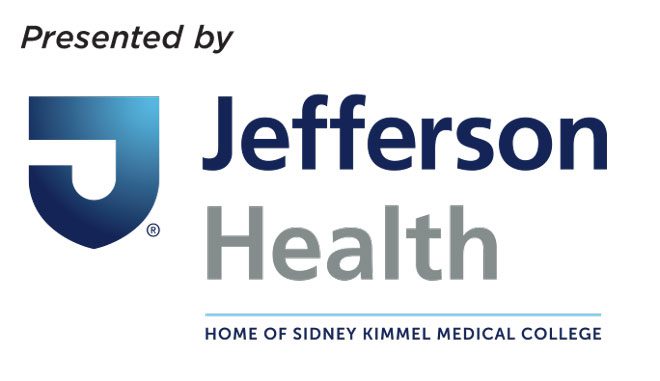
Women care for so many people in their lives, yet they often forget their own wellbeing. Cancer specialists from Sidney Kimmel Comprehensive Cancer Center – Jefferson Health gave us information on what every woman should know to help them stay cancer free. If your goal in life is to help your friends and family, these physicians will tell you to take care of yourself first.
Participants are from Sidney Kimmel Comprehensive Cancer Center – Jefferson Health, Jefferson Cherry Hill and Washington Twp. Hospitals
Participants:
Valerie Bauer, MD Colon & Rectal Surgeon
Lindsey Ford, MD Gynecologic Oncologist
Rachel Berger, MD Breast Surgeon
Lisa Zorn, MD Medical Director, Breast Imaging
 Preventing cancer
Preventing cancer
Colorectal cancer is the only preventable cancer. Screening colonoscopies aim to find pre-cancerous lesions, called adenomas. If we can find and remove those early, that prevents colon cancer. So colorectal cancer is unique in that way. I think it’s one of the only cancers that’s preventable.
Dr. Valerie Bauer
Breast cancer is not necessarily preventable, but we have good early detection tools, so with screening, we’re able to find things at a very early stage. For people who are high risk for breast cancer because of a gene mutation, there are some steps they can take to greatly reduce their risk for getting breast cancer, including preventative surgeries.
Dr. Rachel Berger
Within gynecology, cervical cancer is preventable. With screening, we’re able to detect pre-invasive disease and treat that to avoid invasive cervical cancer. Other disease sites within gynecology, like ovary, are not preventable though.
Dr. Lindsey Ford
Putting off screenings
I think many people put off mammography because they may be afraid of potentially what might be found. Also, there is a lot of misinformation about recommendations on when you should be screened. And in some communities, the problem is access. We’re trying to reach out to underserved, underinsured populations to make sure they’re getting their screening mammograms. The important thing is to know that the sooner we catch it, particularly breast cancer, the more we can do for you with less harmful treatments.
Dr. Lisa Zorn
Women lead very busy lives, and women often prioritize the care of others above themselves. That’s another variable that is extremely important to recognize and acknowledge. I encourage patients to prioritize themselves first as a caretaker, because if you’re not well, you’re not going to be able to take care of the people you love and care for.
Dr. Valerie Bauer
If you haven’t had your screenings yet and you’re feeling a little bit afraid or ashamed, the best time to start is now. No one will shame you. We’re here for you.
Dr. Rachel Berger
 The role of family history
The role of family history
With every new patient, I look at who had cancer in the family, at what age they were diagnosed and what was the disease site. There are a few recommendations from our national guidelines. Indications for someone to get screened include if you have a close family member diagnosed with cancer before they were 50 years old, if you have a personal history of ovarian cancer, or a family member with pancreatic cancer, male breast cancer or high-risk prostate cancer. With ovarian cancer, there’s a genetic component about a quarter of the time. It doesn’t explain all of our ovarian cancer but those are the best indications.
Dr. Lindsey Ford
It’s very important to understand and know your family history. A lot of patients come in and they don’t know what their parents died from. It’s important to probe and ask these questions with family members, because with certain patterns of family history, we will recommend that the patient gets screened not just for colon cancer, but for other cancers. A family history of any colon cancer in your family – first-degree relative, second-degree relative, multiple people in your family – will exponentially increase your risk for having polyps and/or colon cancer.
Dr. Valerie Bauer
With breast cancer, not all family history is the same. If you have a grandmother who is diagnosed with breast cancer at 85 years old, that does not constitute a significant family history for risk of developing breast cancer. We’re concerned about patients whose family members have been diagnosed pre-menopausal, so at a young age. The American College of Radiology recommends that women get a risk assessment by age 30 to determine if they are high risk or not, because that will change the recommended screening studies for that woman. For women who are considered high risk, meaning they have more than a 20% higher risk of developing breast cancer, we would want them to be screened with testing like breast MRI, in addition to a mammogram.
Dr. Lisa Zorn
I think a lot of people think, “Oh, if I don’t have a family history, I can’t get breast cancer.” Unfortunately, the two biggest risks for getting breast cancer are having breasts and getting older. Only 5-10% of breast cancers are hereditary breast cancers, and the vast majority are not related to gene mutation. But it’s really important to know your family history, and especially make note of people who are diagnosed with breast cancer before the age of 50. And sometimes people don’t think to ask about their father’s side of the family. They think of breast cancer only on their mother’s side, but it’s important to know your family history on both sides.
Dr. Rachel Berger
 Lynch Syndrome
Lynch Syndrome
Lynch syndrome is a hereditary syndrome that’s associated with multiple types of cancers. In the space of gynecology, endometrial cancer and a small portion of ovarian cancer are related to Lynch syndrome. Depending on the type of mutation, because there are multiple types that can be a part of this syndrome, there are recommendations for either risk-reducing surgery or increased screening for these patients.
Dr. Lindsey Ford
In patients with Lynch syndrome, there’s a 30-60% incidence of endometrial cancer. There’s an 80% lifetime risk for colon cancer in patients with Lynch syndrome. So for example, the patients I follow with Lynch syndrome may elect at a young age, at age 30 or 35, to undergo a colectomy to reduce their 80% lifetime risk, but they may not be done with reproduction. So that’s where sending the patient to Dr. Ford is crucial, because that patient may want to have children and then afterwards opt for an elective hysterectomy to reduce their overall lifetime risk for endometrial cancer.
Dr. Valerie Bauer
The important thing that you can see here is that for patients who have a hereditary syndrome, it’s a team approach. It’s multiple teams, and we all work together to make sure the patient has the best outcome.
Dr. Lindsey Ford
Lifestyle factors & cancer risk
Endometrial cancer is the most common gynecologic malignancy, and it is related to excess weight or obesity. The number one way to prevent endometrial cancer is by having a healthy weight.
Dr. Lindsey Ford
There’s some very interesting data concerning the microbiome and the association between diet and development of early cancer. There is an epidemic of younger people getting diagnosed with colon cancer. The incidence of colon cancer and survival in patients older than 50 has actually improved over time, but we are seeing an exponential rise in the diagnosis of colon cancer in younger patients, and there are a lot of very, very smart people scratching their heads and asking why. We’re not 100% sure. There was a recent ASCO study that looked at taurine, which is an amino acid prevalent in energy drinks. This is fascinating – taurine was seen as being a fuel for some of the more detrimental microbiota that are seen in high levels in young people with colon cancer. There’s some very interesting research right now.
Dr. Valerie Bauer
Alcohol consumption can increase your risk of cancer, including even moderate consumption. Sometimes people don’t realize how much they’re consuming, so it could be important to assess that for yourself and really think about how much alcohol you consume on a weekly basis. That’s not to say people should never drink, people should enjoy their lives. But pay attention to how much you’re consuming and reduce your consumption if possible.
Dr. Rachel Berger
 HRT & breast cancer
HRT & breast cancer
This is a controversial topic and it’s getting a lot of attention, rightfully so, because women’s health concerns have been generally ignored for a long time. With the Women’s Health Initiative, which was conducted in the ’70s, the pendulum definitely swung too far one way, and I would caution against it now swinging too far the other way. There are certain populations where limited amounts of hormone replacement therapy can definitely be beneficial. It’s a risk-benefit conversation. People might find it acceptable to have a slight increased risk of breast cancer in exchange for a significant increase in their quality of life, especially in the perimenopausal and into menopausal period of time. It’s important to make a decision on a case-by-case basis, and to be aware that there is some evidence of an increased risk of breast cancer, especially if you have a strong family history, have a personal history of breast cancer or a gene mutation. I think the pendulum will land somewhere in the middle, because HRT can be a valuable treatment for women, but it should be under the supervision of your physician after a detailed conversation about all the risks and benefits, and after considering your personal factors.
Dr. Rachel Berger
Advancements in technology
Within radiology, we’re always developing new technologies. The mammogram is the gold standard for breast cancer screening. And we now have tomosynthesis, or the 3D mammogram, which allows us to see slices through the breast and get a nice look at the tissue. We also have other modalities we use in conjunction with mammograms. At least half of the population has dense breasts, which can make it difficult for us to find cancer on the mammogram. In those cases, we can perform a supplemental screening with ultrasound or breast MRI and look at the tissue in a different way, so the breast density is no longer an issue.
Dr. Lisa Zorn
A lot of new, exciting technology is being considered for the early detection of colorectal cancer. AI-facilitated colonoscopies are getting a lot of attention right now, so is the use of artificial intelligence to help detect abnormalities. Another interesting thing we have now is the Cologuard test, which is a stool sampling test that actually detects tissue in the bowel movement that can be associated with colon cancer. Basically, the test evaluates some of the cells that are shed from the lining of your colon for specific genetic mutations that might indicate you have a higher risk for colon cancer. Patients who have a positive Cologuard test are then referred for a diagnostic colonoscopy. If you’ve had a past history of colon cancer, or you are in a high-risk group for colon cancer, or if you are symptomatic, you should not have a Cologuard test. You should be referred for a colonoscopy.
Dr. Valerie Bauer
What everyone should know about cancer detection
It just takes a phone call. Finding a team like the team we have here at Jefferson that is unified and multi-disciplinary should give you peace of mind that you are in good hands with caring people who care about you and who also care about each other.
Dr. Valerie Bauer
There’s no amount of normal post-menopausal bleeding. If a woman has spotting after menopause, even a little bit, even once, she needs to go see a doctor. Abnormal bleeding is the number one symptom for the detection of uterine cancer.
Dr. Lindsey Ford
The whole key to screening is to find things early, so it’s important to have your screening tests, because the sooner we find things, the better the prognosis and the less extensive the treatment will be.
Dr. Lisa Zorn
We recommend mammograms for women with an average risk of breast cancer starting at age 40 and then every year after. If you have an increased risk, it’s important to talk to your physician to personalize your screening. The recommendation for women who have a significant family history or a gene mutation might be to start 10 years earlier than the youngest age of the family member’s diagnosis.
Dr. Rachel Berger
One thing a woman can do to reduce her risk of cancer
I would encourage HPV vaccination, smoking cessation and maintaining a healthy weight, as well as knowing your family history and seeing if you need to be screened for genetic reasons.
Dr. Lindsey Ford
If you are of average risk of breast cancer, get an annual mammogram starting at age 40.
Dr. Lisa Zorn
Talk to your doctor about doing a risk assessment for breast cancer, which includes family history and some other personal risk factors. That can help guide your screenings.
Dr. Rachel Berger
Cancer myths
It’s a myth that ovarian cancer is silent. We often see that women have symptoms prior to diagnosis, so if anybody notices a change in bowel function, abdominal swelling, inability to eat a full meal, abnormal bleeding or bladder changes, be sure to present to a doctor for evaluation.
Dr. Lindsey Ford
It is a myth that if you’re diagnosed with colorectal cancer that automatically means you are going to get a colostomy. We have incredible advances in technology and how we do surgeries to remove the cancer without a colostomy. That is a myth.
Dr. Valerie Bauer
It’s a myth that young and very young women can’t get breast cancer. So young women shouldn’t ignore a new breast lump. They should be seen by a physician and evaluated with appropriate imaging.
Dr. Rachel Berger
Message for women who have been diagnosed with cancer recently
Patients are living with cancer longer and with higher quality of life. We have many different new medications that are prolonging life and curing cancer.
Dr. Valerie Bauer
We are here. We have a great team at Jefferson, and we want to come alongside her and those who are important to her and help her walk this journey.
Dr. Lindsey Ford
If you are diagnosed with breast cancer, it’s not necessarily a death sentence. There are a lot of good treatments and very treatable forms of breast cancer, and there are people to help you along the way.
Dr. Lisa Zorn
You’re not alone. We can offer a lot of support, and we have more and more personalized treatments for each person’s individual circumstances.
Dr. Rachel Berger
What work has taught them about life
It’s such a privilege to meet and interact with all my patients who are going through so much. Seeing them have so much gratitude for the things in their life, makes me bring that into my own life. I’ve learned to have more gratitude in my daily life.
Dr. Rachel Berger
My work has taught me that the human spirit is amazing. Each one of my patients has an individual story that is profoundly inspiring to me – that really pushes me to try to do better and to try to do more.
Dr. Valerie Bauer
I’ve learned that life can change on a dime, so I want to enjoy my life and be grateful for what I have.
Dr. Lisa Zorn
My work has taught me that life is precious and we shouldn’t waste a moment. We should always try to prioritize what’s most important.
Dr. Lindsey Ford


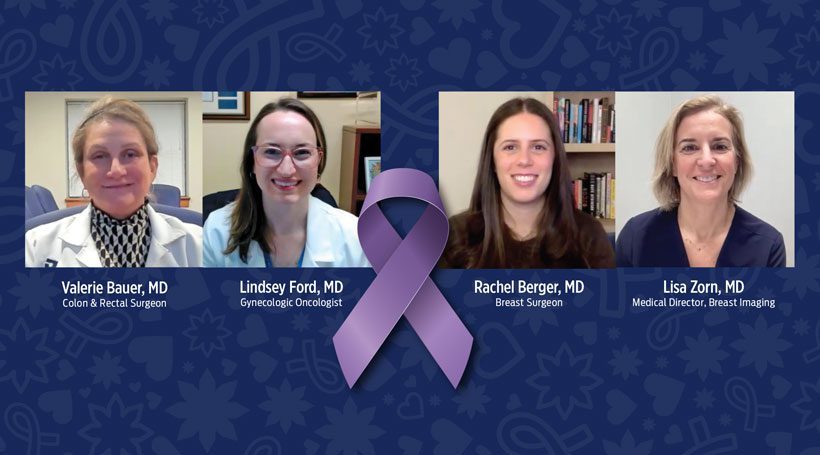

 Preventing cancer
Preventing cancer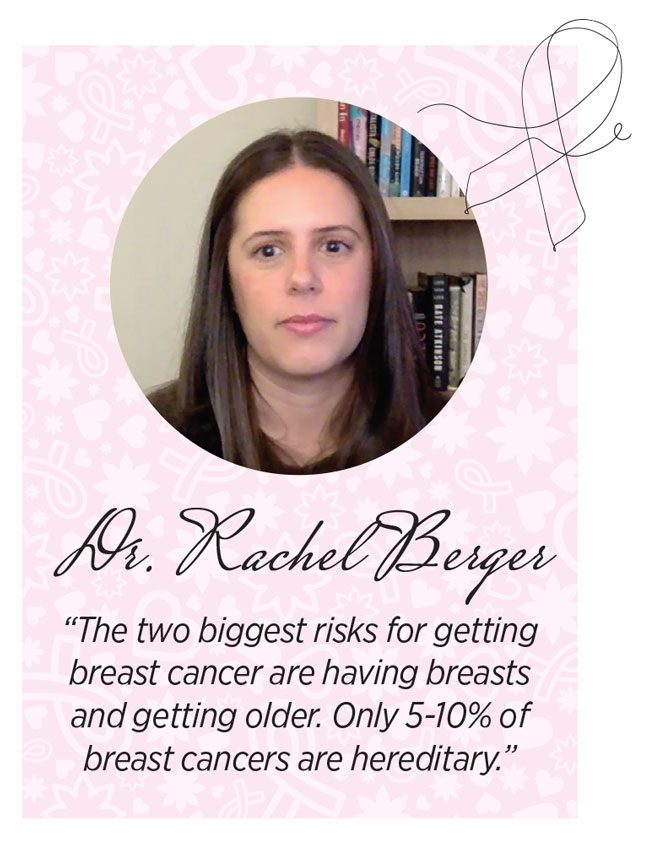 The role of family history
The role of family history Lynch Syndrome
Lynch Syndrome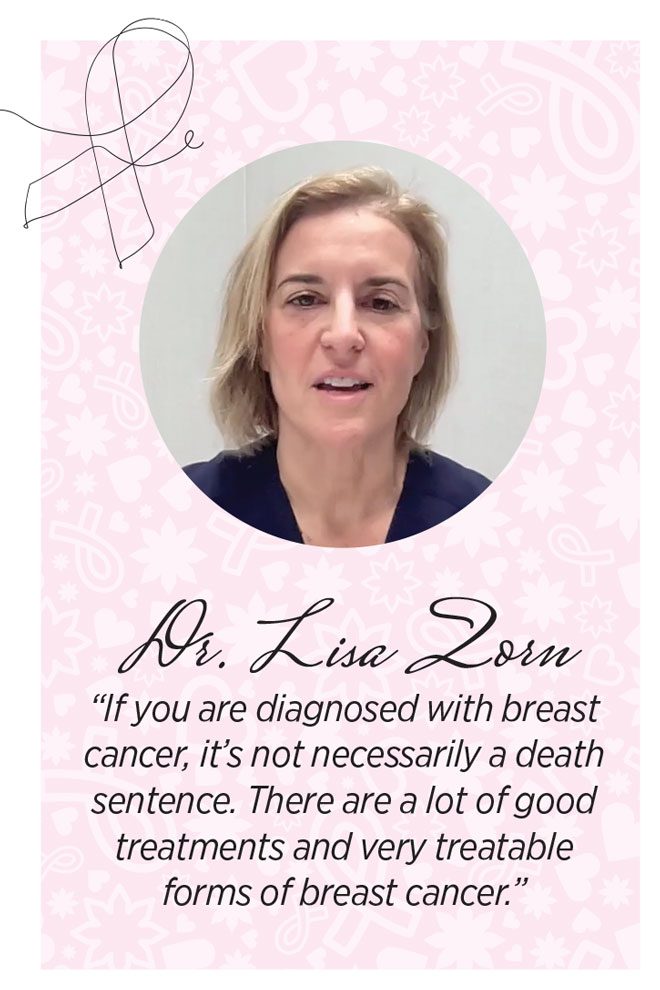 HRT & breast cancer
HRT & breast cancer

